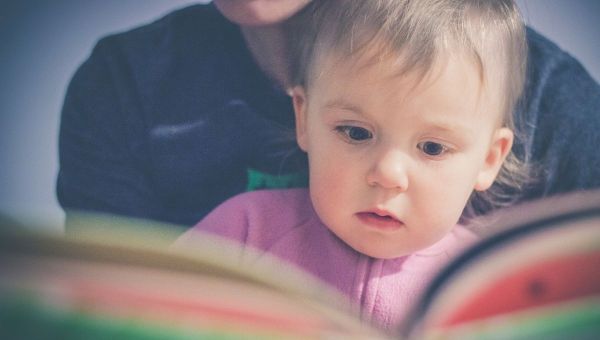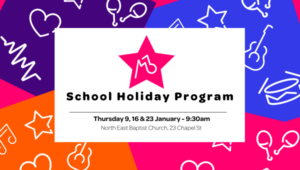
Music Beat Workshop + Symposium 2025
Expanding Horizons: Connecting & Diversifying The Music Beat Australia Workshop and Symposium is an opportunity for Registered Music Therapists (RMTs) to gather, share, collaborate, and

In this blog Award winning Brisbane children’s author Eileen O’Hely shares her thoughts on the benefits of reading to children. Like making music with your child, reading aloud and sharing stories is a great way to spend time together while helping to promote your little one’s language, literacy and brain development.
Storytelling is a keystone of human culture and society. Creation myths, oral histories and even gossip all fall into the category of storytelling. But the type of storytelling that most interests my family is fiction.
Specifically books.
While possibly not the first book I was exposed to, Beatrix Potter’s Peter Rabbit was a bedtime staple when I was growing up. Listening to my parents read this book over and over again (and pointing out when they attempted to skip a page to shorten the reading session) has stood me in good stead.
While reading aloud to children gets them used to the rhythm and sounds of language and exposes them to a wide vocabulary, improved numeracy (from specifically-designed counting books, or simply the numbers on the engines in Thomas the Tank Engine), school readiness, social and emotional skills are also attributed to shared book reading.
Further good news is that a recent trial has shown that two-year-olds who are read to frequently have longer attention spans and display fewer negative behavioural traits when they are four years old than their story-free counterparts.
So when should you start reading to your children? From birth!
Every experience gets stored in their brain, creating neural pathways. In the first few years of life approximately 700 new neural connections in the brain are formed every second. Both genetics and environmental experiences contribute to forming these connections.
Ninety per cent of a child’s brain development happens in the first five years, with the critical development window for early years literacy being before their fourth birthday.
Written English is a complicated language to sound out and amazingly inconsistent when compared to sensible phonetic languages such as Italian, German or Indonesian.
Even when children do master the art of reading aloud fluently, some struggle with comprehending the passage they have just delivered with perfect elocution.
By reading to your children from a young age you will build their vocabulary early and give them a strong foundation for the comprehension skills they will need just a few short years later at school.
Babies and young children learn best by listening and interacting with the important adults in their lives.
This is supported by sharing books with them as well as chatting during daily activities which may include pointing things out at the park and on the way there and back, singing nursery rhymes, or simply naming the items and colours as you hang out the clothes.
Children with a wider exposure to all elements of language have more comprehensive vocabulary, language and cognitive development before they start formal kindergarten and school programs.
Now we’ve established that reading to your child is great for them from a developmental point of view, what about the fun factor?
Sitting around the breakfast table I interviewed a small sample of book-loving children aged 4 to 10, and this is what they said.
The 4-year-old likes reading because she wants to know what’s happening in the book. (There is an opportunity here to build on a child’s comprehension by asking them what they think will happen next before they turn the page, and comprehension is the point of reading!)
The independent reading 7-year-old likes getting pictures in her head from the story (she’s using her imagination – great for neural pathways!).
The 10-year-old likes how books create a whole other world. Sometimes he gets so engrossed in that world that he will take his book everywhere (literally everywhere) he goes, bar the shower.
Admittedly, I stopped reading novels for a time during my teens. I imagined that if I was a character in a book I’d be pretty boring to read about, just sitting still and reading.
Instead, I decided to be more like the characters in the books I had read and went out and did stuff. Hey – I was a teenager and yet to learn about doing things in moderation.
Now going back to reading, I find I prefer to read Young Adult books, as these are about characters who go out and take on the world and more often than not they succeed.
Should you ever stop reading to children? No.
If they’re not too engrossed in other activities my 7- and 10-year-old will stop what they’re doing and listen in when I read to my 4-year-old.
My 10-year-old will read passages he finds amusing or interesting out loud to share with the family, often thrusting a newly-digested book at us and insisting we read it.
Even my husband and I read small snippets of things to each other from time to time.
Reading in our house is not a solitary pastime, and with all the benefits it brings to growing minds, it should be encouraged in every family.
Eileen has published 10 children’s books. Her work has been translated into three languages, and she is published in five countries. She is a Boppin’ Mumma who has been boppin’ with her youngest child for the past 3 years. Miss Y is now in our preschool program.
She will be reading from her latest Kitten Kaboodle spy-cat adventure The Lightning Opal! at Boppin’ Babies 10th Birthday Party on Friday 22 September 2017. Her series about the spy cat Kitten Kaboodle is on the Premier’s Reading Challenge in several Australian states.
Save
Save
Save
Save
Save

Expanding Horizons: Connecting & Diversifying The Music Beat Australia Workshop and Symposium is an opportunity for Registered Music Therapists (RMTs) to gather, share, collaborate, and

MELP Holiday Programs just for you! BACK BY POPULAR DEMAND – we are so excited to announce that Miss Anna will host “Special Edition Summer